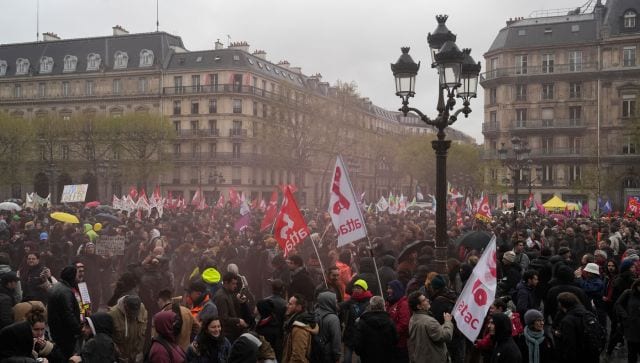France’s controversial pension reform now a law: What happens next?
France’s controversial pension reform now a law: What happens next?

France’s president Emmanuel Macron has signed hugely unpopular pension reforms into law, hours after the country’s top court gave its nod.
On Friday (14 April), the Constitutional Council green-lit key provisions of Macron’s pension reforms that would increase the retirement age from 62 to 64. However, the nine-member council also struck down six minor proposals, including a “senior index” that would require companies with over 1,000 employees to hire employees over 55, reported BBC.
The Constitutional Council also rejected a first request by Opposition lawmakers to hold a citizens’ referendum on the pension reform.
The pension reforms have led to months of unrest on French streets, with protesters demanding the government repeal the proposal.
What happens now? What was the reaction to the Constitutional Council’s ruling and what does it mean for the protests? Let’s find out.
What does this mean?
As the reform has been promulgated into law, the retirees will have to wait an extra three months for their state pensions from this September, as per CNN.
The country’s labour minister Olivier Dussopt said earlier the reforms are expected to come into effect from early September.
With incremental increases, the retirement age will reach 64 by 2030.
Under the new legislation, people will also be required to work for 43 years in order to avail full pension.
Notably, France is still behind many of its European neighbours which have raised the retirement age to 65 or above, reported AFP.
Moreover, a second bid by the Opposition to organise a referendum is likely to be reviewed by the Constitutional Council in early May, as per Reuters.
ALSO READ: Will France’s pension protests turn into another yellow vest movement?
Protests erupt in France
France witnessed protests soon after the court’s ruling was announced. Thousands assembled outside Paris City Hall to oppose the order.
Lucy, a 21-year-old protester gathered outside the City Hall, told the BBC that she was disappointed “we don’t have the power anymore”. “Nobody is listening to us no matter how hard we are shouting”.
Another demonstrator told Associated Press (AP) that she was “disappointed but not surprised” by the ruling.

Fires were also started across Paris, with police using tear gas at some places to disperse the protesters. BBC reported citing a Paris police official that 112 people were arrested.
Some people burned trash bins as they rallied through the capital city, chanting a popular anti-Macron slogan: “We are here, we are here, even if Macron does not want it, we are here”, reported Reuters.
Demonstrators also rallied in other cities, including Marseille, Toulouse and Lyon.
In the western city of Rennes, protesters set ablaze the entrance of a police station and a conference centre, reported AFP.
“The attacks in Rennes… by thugs determined to fight it out are unacceptable,” the country’s interior minister Gerald Darmanin wrote in a tweet.
Why is the government adamant?
Polls have shown that the majority of French people are against increasing the retirement age by two years.
Unions have organised 12 nationwide protests since January to express their opposition.
However, Macron has justified the plan, calling it “necessary” to keep the pension system afloat in the long term.
The government has estimated an annual shortfall of $14.8 billion by 2030 if the pension reform is not adopted.
“I’m proud of the French social model, and I defend it, but if we want to make it sustainable we have to produce more,” the French president said on Wednesday while visiting the Netherlands, as per Al Jazeera.
“We have to re-industrialise the country. We have to decrease unemployment and we have to increase the quantity of work being delivered in the country. This pension reform is part of it.”
In March, the government used a special constitutional power to ram the pension reforms through the lower house of parliament, which further angered the protesters.
Analysts say that though the court’s approval is a huge victory for Macron, it has come at a “major personal cost” for the president, with his approval ratings near their lowest levels ever, as per AFP.
Following the court ruling on Friday, trade unions unsuccessfully appealed to the president not to sign the reforms into law. They highlighted that six concessions that were added to the legislation were removed by the top court, thus making the law “even more unbalanced”, reported BBC.
Critics of the reforms argue they penalise women and unskilled workers who start their careers early and would now have to work longer to receive pension.
ALSO READ: Explained: France’s nationwide strikes over Emmanuel Macron’s pension reforms
Political reactions to the top court’s ruling
French prime minister Elisabeth Borne said the court had “judged the reform, on the substance as well as procedure, to conform with the constitution”.
“This evening, there are no winners or losers,” she wrote in a tweet.

Communist Party leader Fabien Roussel said signing the law “would not be pouring oil on the fire, but a jerrycan full of petrol”.
“I fear an outpouring of anger,” he told BFM television, according to AFP.
Far-left France Unbowed (La France Insoumise) leader Jean-Luc Mélenchon declared the “fight” would continue. “The Constitutional Council’s decision shows that it is more attentive to the needs of the presidential monarchy than to those of the sovereign people,” he was quoted as saying by BBC.
Far-right National Rally (Rassemblement National) party leader Marine Le Pen tweeted that “the political fate of the pension reform is not sealed”. “The people always have the last word, it is the people’s right to prepare for the change in power that will be the result of this unnecessary and unjust reform.”
Will the protests continue?
Seems so.
Unions and Opposition leaders have vowed to continue the pressure on the government to take back the reforms.
The leader of the French union CGT, one of the country’s main unions, has called on workers to return to the streets for a “historic” protest on 1 May – international workers’ rights day.
“All French people, note down the date, we have to be in the street to stop this law from coming into force,” Sophie Binet, the head of CGT, told CNN’s affiliate BFMTV.
“The lives of French men and women do not depend on the opinion of nine people,” she added.
Carl Pfeiffer, a 62-year-old retiree protesting outside City Hall, warned the ruling would not mark the end of unrest.
The council members “are irresponsible, because the anger that will come right after in the country, it’s their fault,″ he told AP.
With inputs from agencies
Read all the Latest News, Trending News, Cricket News, Bollywood News,
India News and Entertainment News here. Follow us on Facebook, Twitter and Instagram.
What's Your Reaction?



























































